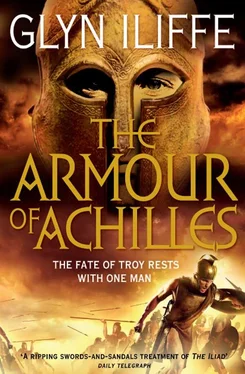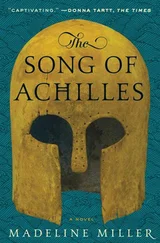Glyn Iliffe - The Armour of Achilles
Здесь есть возможность читать онлайн «Glyn Iliffe - The Armour of Achilles» весь текст электронной книги совершенно бесплатно (целиком полную версию без сокращений). В некоторых случаях можно слушать аудио, скачать через торрент в формате fb2 и присутствует краткое содержание. Год выпуска: 0101, ISBN: 0101, Издательство: Pan Books, Жанр: Старинная литература, на английском языке. Описание произведения, (предисловие) а так же отзывы посетителей доступны на портале библиотеки ЛибКат.
- Название:The Armour of Achilles
- Автор:
- Издательство:Pan Books
- Жанр:
- Год:0101
- ISBN:9781447205098
- Рейтинг книги:4 / 5. Голосов: 1
-
Избранное:Добавить в избранное
- Отзывы:
-
Ваша оценка:
- 80
- 1
- 2
- 3
- 4
- 5
The Armour of Achilles: краткое содержание, описание и аннотация
Предлагаем к чтению аннотацию, описание, краткое содержание или предисловие (зависит от того, что написал сам автор книги «The Armour of Achilles»). Если вы не нашли необходимую информацию о книге — напишите в комментариях, мы постараемся отыскать её.
The Armour of Achilles — читать онлайн бесплатно полную книгу (весь текст) целиком
Ниже представлен текст книги, разбитый по страницам. Система сохранения места последней прочитанной страницы, позволяет с удобством читать онлайн бесплатно книгу «The Armour of Achilles», без необходимости каждый раз заново искать на чём Вы остановились. Поставьте закладку, и сможете в любой момент перейти на страницу, на которой закончили чтение.
Интервал:
Закладка:
‘Go on.’
‘The gods wanted to destroy Ajax, but they also wanted to prevent him keeping the armour for himself. They say it’s meant for another, someone even more worthy than Ajax.’
‘Then who? Ajax’s son, Eurysaces?’
‘No. And I wouldn’t curse the poor child with it – you do realize it’s cursed, don’t you? It’s the symbol of everything that’s bad about this war.’
‘Perhaps we should send it to the Trojans, then. After all, it was Paris who killed Achilles. He’s welcome to have the armour, and good riddance to it.’
Odysseus glanced at his friend and smiled, looking a bit more like his old self. He dismissed the suggestion with a shake of his head.
‘The Trojans have enough problems of their own. But whoever the rightful owner is, Athena said he is destined to take Achilles’s place in the army and that the walls of Troy won’t fall without him. I suppose I’ll know who to give the armour to when I see him.’
‘So is this what you’ve been thinking about all this time?’
‘No, I’ve been thinking about home. This war isn’t infinite, Eperitus. The end must come and I’ve been wondering how I can hasten it along. I keep thinking of Astynome getting through the gates in the back of that old farmer’s cart, and the story Omeros concocted about how I got past those Taphian guards concealed in a pithos of wine. You remember that one? The only problem is I’m not sure how I’m going to smuggle an army inside the Scaean Gate.’
He looked quizzically at Eperitus, who nodded without comprehending a word of what Odysseus was saying.
‘But suddenly my mind is full of Ithaca again,’ Odysseus continued. ‘I’ve been trying to remember how it looks from the prow of a galley, sailing up from the south – the shape of the hills, the channel between Samos and Ithaca, the harbour below the town, and then the road that leads all the way up to the palace gates. And I can picture what Penelope looks like again, Eperitus. I haven’t been able to recall her face for so long, and then I saw her in a dream the night before Ajax killed himself, as clear as if I had only seen her that morning. And I’m going to see her again soon, I’m sure of it.’
‘Good,’ Eperitus said.
He smiled despite the pain he felt. Odysseus’s renewed desire for his home and family reminded him that he had lost his own love, and that all his dreams of marriage and children had been ripped apart by Astynome’s betrayal. And yet he could not bring himself to stop loving her, and he knew they would meet again one day – even though the walls of Troy lay between them.
‘And there’s something else,’ Odysseus added, ominously. ‘A new prophecy.’
Eperitus shifted round in the sand and looked at his friend.
‘Calchas?’
Odysseus nodded. ‘Before we left to fetch Ajax’s body, Agamemnon took me aside. Calchas came to him early in the morning, while we were fighting your father in the temple of Thymbrean Apollo. He says Zeus will not bring an end to the war until a number of conditions are met, but Apollo has only shown the first one to him. I suspect one might be the identity of the rightful owner of Achilles’s armour, but, either way, these oracles will only be revealed by another seer – a Trojan – though Calchas doesn’t know who or when.’
‘Then what does he know?’
‘That for Troy to fall Paris must first be killed by the arrows of Heracles.’
Eperitus’s eyes narrowed in thought.
‘But . . . but they belong to Philoctetes,’ he said, ‘whom we abandoned on Lemnos ten years ago!’
‘Yes,’ Odysseus said. ‘The problem is, we’re the only ones who know where he was marooned, and now Agamemnon wants us to fetch him back. We leave at dawn tomorrow.’
A UTHOR’S N OTE
The first two books in this series, King of Ithaca and The Gates of Troy , retold some of the earlier myths associated with Odysseus and the beginnings of the Trojan War. They drew on a handful of lesser-known tales that allowed my imagination plenty of room for manoeuvre. The Armour of Achilles , however, is set at the peak of the war, the epic events from which have been told and retold by countless poets, playwrights and other storytellers, both Greek and Roman. Rather than being able to pick over a few myths like a guest at a modest buffet, I now had a feast to choose from and was forced – often reluctantly – to restrict myself to those myths I thought most important and relevant to the tale I wanted to tell.
Chief among the ancient sources for the Trojan War is, of course, Homer. His is the name behind the oldest works of Western literature, The Iliad and The Odyssey , in which such themes as glory, wrath, fate and homecoming are explored in the brutal and uncertain lives of figures such as Achilles, Hector and Odysseus. Ironically, The Iliad covers only a brief, if bloody, period of the war: nearly seven weeks in total. Twenty-one of its twenty-four chapters cover just eight days. It begins with Chryses’s appeal to the Greeks for the return of his daughter, Chryseis (also known as Astynome) and ends with the funeral pyre of Hector. Naturally, much of The Armour of Achilles follows the action in The Iliad , though I have made the gods less prevalent and highlighted Odysseus’s part in the story. The events before and after come from a variety of other Greek and Roman sources, some of which are lost and are known today only from quotes and references by later writers.
The Armour of Achilles begins with the sacking of Lyrnessus, something that happens off-stage as far as the main myths are concerned. As for the stoning of Palamedes, the original version has Odysseus planting gold in his tent to frame him for an act of treason he did not commit, purely out of spite. The ancient writers were often divided in their portrayals of Odysseus: some depicted his keen wits and great oratory as heroic, while others saw his cunning nature as quite the opposite. For obvious reasons, I have tried to make him appear in a more positive light.
The battles with the Amazons and the Aethiopes that follow Hector’s funeral are epic stories in their own right and, by necessity, have been curtailed in my own version of them. The death of Achilles happened differently in different sources – some have him stabbed from behind while others say he was shot down with an arrow; in either case, he remained undefeated in individual combat, as befits a hero of his stature. Similarly, the only man who could kill Ajax was himself. He was driven to self-destruction out of pride, unable to bear the humiliation of losing the armour of Achilles to Odysseus. In the original myths, Odysseus wanted the armour for his own personal gain, but again I have tried to save his credibility by giving him a more worthy motive.
There are other threads in The Armour of Achilles that are entirely my own invention. The story of Eperitus and his ruthlessly ambitious father, Apheidas, is one of them. So is the romance between Eperitus and Astynome, though Astynome does appear as a minor figure in the original tales. Equally, the background events on Ithaca can be found nowhere in the myths, even if Penelope’s longing for her husband’s return is very Homeric. But unfortunately for her, she cannot be reunited with Odysseus until the Trojans are defeated and their city razed to the ground. For that to happen, Odysseus must first fulfil the oracles set down by the gods and find a way to breach the impenetrable walls of Troy.
Beware Greeks bearing gifts!
PRAISE FOR GLYN ILIFFE
‘A must read for those who enjoy good old epic battles,
chilling death scenes and the extravagance of ancient Greece’
Читать дальшеИнтервал:
Закладка:
Похожие книги на «The Armour of Achilles»
Представляем Вашему вниманию похожие книги на «The Armour of Achilles» списком для выбора. Мы отобрали схожую по названию и смыслу литературу в надежде предоставить читателям больше вариантов отыскать новые, интересные, ещё непрочитанные произведения.
Обсуждение, отзывы о книге «The Armour of Achilles» и просто собственные мнения читателей. Оставьте ваши комментарии, напишите, что Вы думаете о произведении, его смысле или главных героях. Укажите что конкретно понравилось, а что нет, и почему Вы так считаете.












